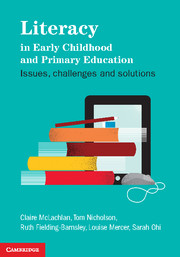Book contents
- Frontmatter
- Contents
- List of figures
- List of tables
- About the authors
- Acknowledgements
- Chapter 1 Introduction
- Part 1 Literacy acquisition: the child, the family and diversity in the modern world
- Chapter 2 Literacy acquisition in the early years: past, present and future
- Chapter 3 When should children start literacy learning?
- Chapter 4 Family literacies and relationships with centres and schools
- Chapter 5 Multiliteracies: growing the next generation of readers
- Chapter 6 Diverse classrooms and learning in bilingual and multicultural/multilingual settings
- Part 2 Learning about literacy in early childhood settings
- Part 3 Literacy learning in the primary school
- Part 4 Literacy learning in the senior primary school
- References
- Index
- References
Chapter 4 - Family literacies and relationships with centres and schools
from Part 1 - Literacy acquisition: the child, the family and diversity in the modern world
- Frontmatter
- Contents
- List of figures
- List of tables
- About the authors
- Acknowledgements
- Chapter 1 Introduction
- Part 1 Literacy acquisition: the child, the family and diversity in the modern world
- Chapter 2 Literacy acquisition in the early years: past, present and future
- Chapter 3 When should children start literacy learning?
- Chapter 4 Family literacies and relationships with centres and schools
- Chapter 5 Multiliteracies: growing the next generation of readers
- Chapter 6 Diverse classrooms and learning in bilingual and multicultural/multilingual settings
- Part 2 Learning about literacy in early childhood settings
- Part 3 Literacy learning in the primary school
- Part 4 Literacy learning in the senior primary school
- References
- Index
- References
Summary
Chapter objectives
To consider the importance of family literacy and associated research.
To consider how schools and families can work together to help children to learn.
To critically examine the research on engaging families in the reading process.
This chapter explores the growing body of research, conducted with families internationally, on the different patterns and expectations of literacy in homes and schools. It examines recent longitudinal studies in New Zealand, the United Kingdom and the United States, as well as in-depth studies on family literacy programs that have attempted to bridge the gaps between homes and schools to support literacy acquisition. This chapter also gives practical advice on how to engage parents in the reading process, drawing on recent research to provide examples of effective involvement with families.
What is family literacy?
Research demonstrates that the family is a powerful force for literacy learning and that this finding is the case across social and cultural groups (Anderson & Morrison 2011; Taylor & Dorsey-Gaines 1988). According to Cairney (2003), research shows that the family’s influence on children’s learning does not stop at five years of age when the child starts school. Instead, differences in family backgrounds have been found to be a significant predictor of school achievement, and there are strong relationships between parents’ knowledge, beliefs and interaction styles and children’s school achievement. Because of this evidence, family involvement in children’s education is widely recognised as a key component of effective education. Involvement includes parents, caregivers, siblings and extended family such as grandparents (Taylor & Dorsey-Gaines 1988).
- Type
- Chapter
- Information
- Literacy in Early Childhood and Primary EducationIssues, Challenges, Solutions, pp. 48 - 64Publisher: Cambridge University PressPrint publication year: 2012



